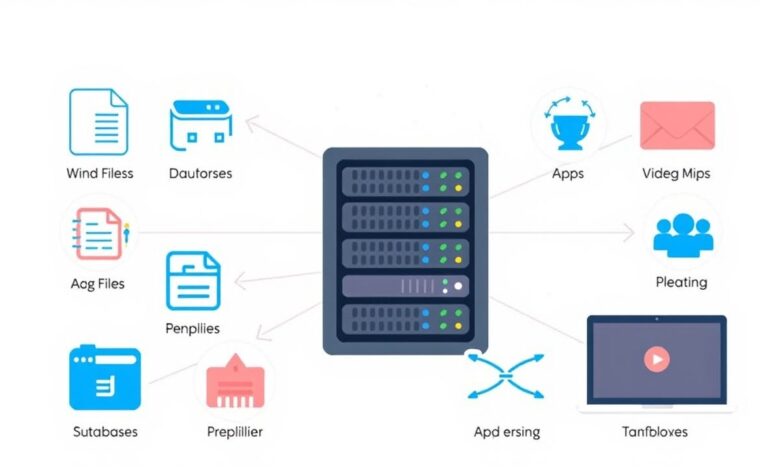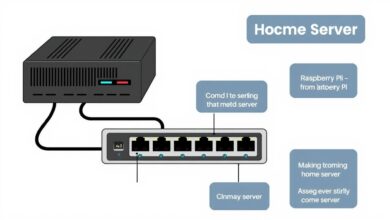Beyond the Website: Exploring Common Server Use Cases

Many people associate servers primarily with hosting websites. While web hosting is a massive application, it’s just one piece of the puzzle. Servers are powerful machines designed to provide resources, manage data, and run applications for other computers (clients) over a network. Their true versatility lies in their ability to handle a diverse range of tasks critical to both individuals and businesses. Understanding these common server use cases beyond web hosting is essential for anyone looking to leverage the full potential of server technology, from setting up a home network to managing large-scale enterprise IT infrastructure.
Servers, at their core, are built for reliability, performance, and centralized management. This makes them ideal for functions requiring constant availability, significant processing power, or the ability to share resources efficiently.
Common Server Use Cases Beyond Web Hosting
Let’s dive into some of the most prevalent ways servers are utilized when they aren’t busy serving web pages:
File Storage, Sharing, and Backup
One of the most fundamental server use cases is centralized file management. Instead of scattering important documents across multiple computers, a server can act as a central repository. This allows users on a network to easily access, share, and collaborate on files.
* Sharing: Teams can work on shared documents stored on the server.
* Organization: Data is kept in one place, making it easier to manage permissions and versions.
* Backup: Servers are crucial for implementing robust backup strategies, protecting data from hardware failure, accidental deletion, or cyberattacks. Regular automated backups stored securely on a server (or replicated offsite) are non-negotiable for data recovery.
[Hint: Insert image of networked computers accessing files on a server]
Application Hosting
Servers provide the computing power and environment necessary to run various software applications that clients connect to. This goes far beyond typical website applications.
* Game Servers: For enthusiasts, servers host multiplayer online games like Minecraft, allowing players to connect and play together in persistent worlds.
* Enterprise Applications: Businesses rely heavily on servers to run critical applications such as Customer Relationship Management (CRM) systems, Enterprise Resource Planning (ERP) software, and accounting packages.
* Specialized Applications: This can include anything from network controllers (like the Unifi Controller for managing networking gear) to media servers (like Plex or Emby) that stream movies and music to devices around a home or network.
Database Hosting
Databases are the backbone of most modern applications and services, storing vast amounts of structured information. Servers are specifically configured and optimized to host database management systems (DBMS) like MySQL, PostgreSQL, SQL Server, or Oracle.
Hosting a database on a dedicated server provides:
* Performance: Optimized hardware and resources for quick data retrieval and processing.
* Scalability: Ability to handle increasing amounts of data and user connections.
* Security: Centralized control and advanced security measures to protect sensitive information.
Email Hosting and Management
While many use third-party email services, organizations often choose to host and manage their own email servers. This offers greater control over email policies, security, storage limits, and compliance requirements. An email server handles sending, receiving, and storing emails for users within its domain.
Network Management
Servers play a vital role in managing and controlling network resources. This can include:
* Domain Controllers: In corporate networks, servers act as domain controllers (e.g., Active Directory in Windows environments) to manage user accounts, permissions, and security policies across all connected computers.
* DHCP and DNS: Servers often handle Dynamic Host Configuration Protocol (DHCP) for assigning IP addresses to devices and Domain Name System (DNS) for translating domain names into IP addresses. (See: Understanding DHCP: How Servers Get and Assign IP Addresses)
* Monitoring and Management Tools: Servers run software to monitor network traffic, device status, and performance, helping administrators maintain a healthy and efficient network.
Video Streaming
Delivering video content, especially high-definition and live streams to a large audience, requires significant bandwidth and processing power. Dedicated servers are frequently used for hosting and streaming video. This includes services like corporate training video portals, on-demand content libraries, or even personal media streaming setups. The server handles encoding, storing, and distributing the video data efficiently to various client devices.
Handling Resource-Intensive Tasks
Beyond specific applications, servers are often used for tasks that require substantial computing resources that would strain a typical desktop computer.
* Data Processing and Analytics: Running complex calculations, analyzing large datasets, or processing scientific simulations.
* Rendering: Creating 3D animations, visual effects, or architectural renderings.
* Virtualization: Hosting multiple virtual machines (VMs) or containers on a single physical server, allowing for efficient use of hardware resources and easier management of different operating systems and applications. Learn more about virtualization here: Virtualization Explained: What are VMs and Containers?
According to data from Statista, the global server market continues to grow, projected to reach over 130 billion U.S. dollars by 2027, indicating the increasing demand and diverse applications for server technology across various industries.
While web hosting remains a prominent function, these examples illustrate that servers are foundational components for a vast array of digital services and infrastructure. From keeping your personal files safe and accessible at home to powering the complex applications and data systems that drive global businesses, the server use cases extend far beyond just hosting a simple website.
Understanding these different roles can help you appreciate the power and flexibility of servers and perhaps inspire you to explore how they could benefit your own projects or organization. Whether you’re a beginner looking to set up your first home server or an IT professional planning enterprise infrastructure, recognizing the full spectrum of server use cases is the first step.
If you’re new to servers, you might be wondering where to start. We recommend checking out our guide: What is a Server and Why Do Beginners Need One?
[Hint: Insert video explaining server use cases]



